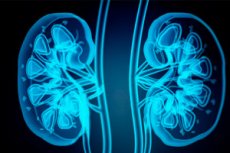Medical expert of the article
New publications
How does alcohol affect the kidneys?
Last reviewed: 30.06.2025

All iLive content is medically reviewed or fact checked to ensure as much factual accuracy as possible.
We have strict sourcing guidelines and only link to reputable media sites, academic research institutions and, whenever possible, medically peer reviewed studies. Note that the numbers in parentheses ([1], [2], etc.) are clickable links to these studies.
If you feel that any of our content is inaccurate, out-of-date, or otherwise questionable, please select it and press Ctrl + Enter.

Alcohol consumption can have a negative impact on kidney function. Here are some ways this can happen:
Dehydration
Dehydration, or dehydration, of the kidneys can occur due to excessive consumption of alcohol, which is a diuretic. Diuretics help increase the excretion of fluid from the body through the kidneys. Here's how it happens:
- Increased urine output: Alcohol stimulates the secretion of the hormone vasopressin, which normally slows urine output. However, alcohol inhibits the action of this hormone, resulting in increased urine production and increased frequency of urination.
- Increased fluid loss: Alcohol consumption leads to increased frequency of urination, which increases fluid loss from the body. This can lead to dehydration, especially with excessive and/or prolonged consumption.
- Decreased ability of the kidneys to retain water: Alcohol consumption can make the kidneys less able to retain water and salts, which increases urine production and can increase dehydration.
Kidney dehydration can lead to a number of problems including electrolyte imbalances, impaired kidney function and kidney stones. It can also have a negative impact on overall health and well-being. It is therefore important to consume alcohol wisely and monitor your hydration levels by drinking enough water to compensate for losses.
Increased pressure in the renal tubules
Alcohol consumption can increase the pressure in the kidney tubules, which can negatively affect kidney function and contribute to a variety of problems. Here's how it happens:
- Vasopressin: Alcohol can affect the hormone vasopressin (antidiuretic hormone), which controls the reabsorption of water in the kidney tubules. Alcohol consumption can inhibit the action of vasopressin, resulting in increased urine volume and increased diuresis. This can increase the pressure in the renal tubules.
- Dehydration: Alcohol is a diuretic, which means that it stimulates the frequency of urination and increases the loss of fluid from the body. Dehydration can increase the concentration of salts and other substances in the urine, which can increase pressure in the kidney tubules.
- Effects on blood vessels: Alcohol can affect the vascular system, including the vessels that supply the renal tubules. Alcohol consumption can cause blood vessels to dilate and increase blood flow in the kidneys, which can increase pressure in the renal tubules.
Increased pressure in the renal tubules can have a negative impact on kidney function and contribute to various problems such as hypertension, kidney failure and others. Therefore, it is important to consume alcohol in moderation and monitor your overall health. If you are experiencing kidney problems or are concerned about your health, see your doctor for counseling and diagnosis.
Inflammation
The pathogenesis, or mechanism of development, of alcohol-induced kidney inflammation involves several key aspects:
- Toxic effects of alcohol on kidney cells: Al cohol and its metabolites can directly damage kidney cells, causing inflammation and impairing their function. Toxic effects of alcohol can cause damage to the kidney tubules and renal tubules.
- Increased risk of infections: Alcohol can weaken the body's immune system, making it more vulnerable to infections that can lead to kidney inflammation. This is especially important for people who suffer from acute or chronic urinary tract infections.
These mechanisms can work together or separately to increase inflammation in the kidneys under the influence of alcohol. As inflammation progresses, various symptoms such as lower back pain, swelling, changes in urine, and other signs of kidney dysfunction may occur. If you suspect kidney inflammation or other problems with the genitourinary system, see your doctor for further evaluation and treatment.
Increased risk of stone formation
Alcohol consumption can increase the risk of kidney stones. Here are some of the mechanisms by which this may occur:
- Changes in urine pH: Alcohol can change the pH of urine, making it more acidic or basic. This can create conditions in which certain types of stones are better able to form. For example, alkaline conditions may favor the formation of calcium stones, while acidic conditions may favor the formation of urate stones.
- Increased calcium excretion: Alcohol consumption can increase urinary calcium excretion. Elevated levels of calcium in the urine may contribute to stone formation, especially oxalate stones.
- Effects on kidney function: Excessive alcohol consumption can have a harmful effect on kidney function, which can lead to the accumulation of toxins and substances that contribute to stone formation.
- Effects on metabolism: Alcohol can affect the body's metabolism, including the metabolism of calcium, uric acid, and other substances that may be linked to kidney stone formation.
Deterioration of blood sugar control
Alcohol can impair blood sugar control, which can be particularly problematic for people with diabetes. Uncontrolled blood sugar can lead to kidney damage and impaired kidney function.
Increased risk of kidney disease
Excessive alcohol consumption can increase the risk of developing various kidney diseases such as chronic kidney failure, glomerulonephritis and others.
In general, alcohol consumption can have a negative effect on kidney function and increase the risk of developing various kidney problems. Therefore, it is important to consume alcohol in moderation or, if you have kidney problems, to see your doctor for advice and treatment.

